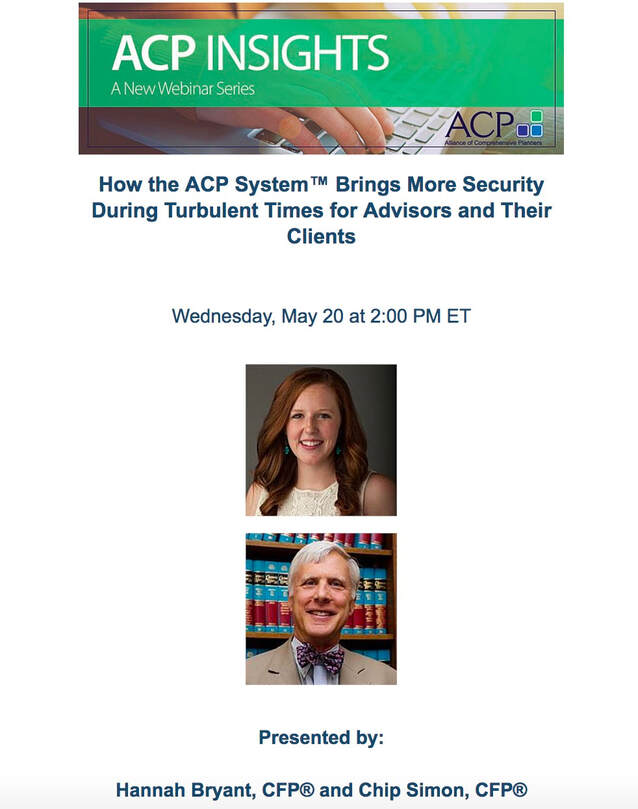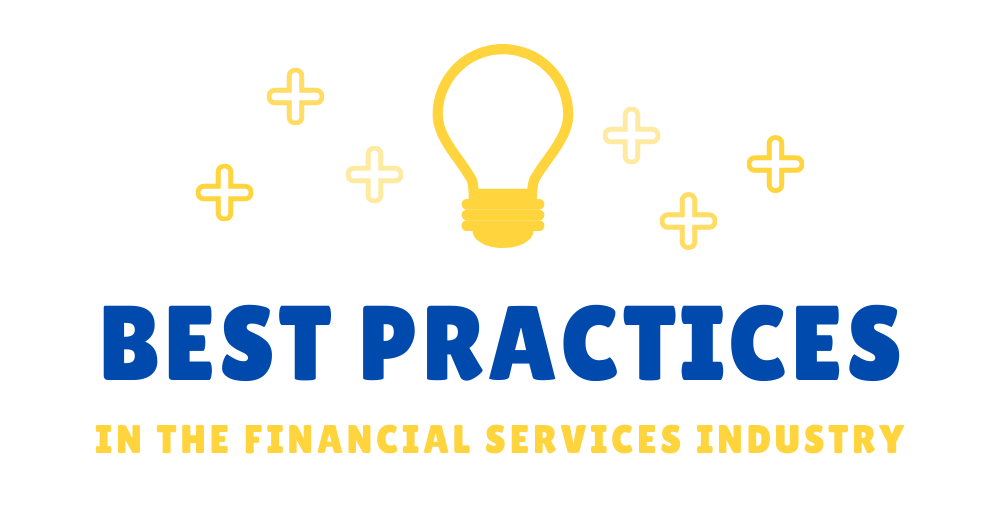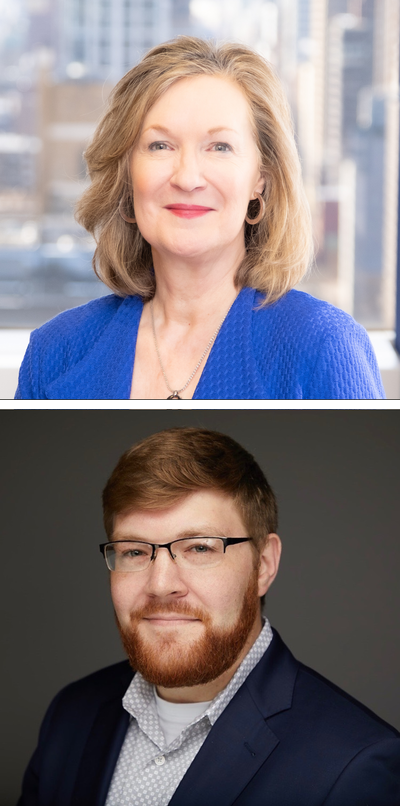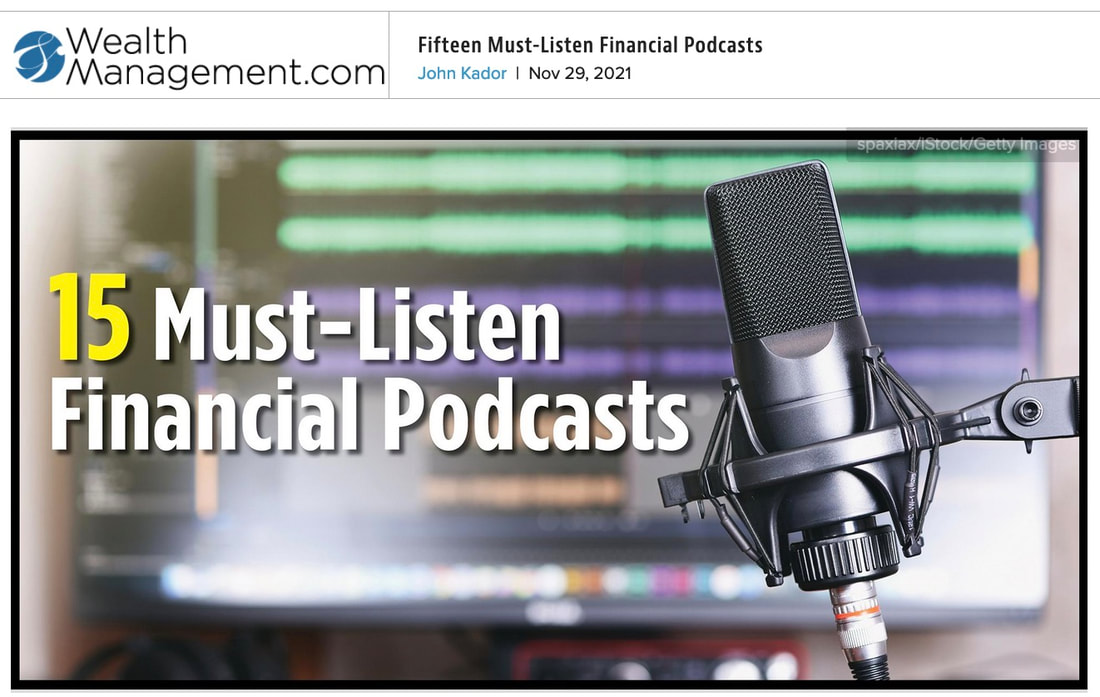How the ACP System™ Reduces Anxiety – for Advisors and Their Clients – During Market Downturns5/4/2020
In this Swift Chat video conversation, I speak with financial advisors Hannah Basil Bryant, CFP®, and Chip Simon, CFP®, who explain how the ACP System™ helps advisors maintain their client base (and their revenue) and why their clients feel safe and secure through market downturns, even during the current worldwide health and financial crisis.
THE TRANSCRIPT FROM THE VIDEO IS BELOW
Marie Swift: Hi everybody and welcome back to another Swift Chat. Today's date is April 28th, 2020 and I'm joined today by Hannah Bryant of Basil Financial Group, who is calling in from Chicago. And also, Chip Simon, who is founder and co-owner of Taconic Advisors, calling in from the Hudson Valley.
We are right in the middle of our at-home, shelter-in-place plans, for the COVID-19 and coronavirus so our hair may not look as gorgeous as normal but I have to say we look pretty darn good considering where we are and how we are all doing. The point of this call, Chip and Hannah, is to talk about how are you doing. I know both of you are fiduciary advisors, part of the ACP (Alliance of Comprehensive Planners) and adhering to that practice model. Side note: Check out the podcast series, Practical Wisdom from ACP Members. I'd like each of you talk a little bit about how you are doing with your clients. Also, how you are doing with your business? How you are coping so well and why you think that is? So, Chip you want to go first? Chip Simon: Age before beauty? Okay, I'll have a whack at it. Thank you, Marie. Actually, I am in transition right now with my practice. I am heading out on the financial independence retirement curve and have a young partner, Meredith Briggs, who is going to be picking up the reins in the future. Recently, we are feeling really blessed because we unplugged from the office and plugged in at home and really didn't miss a beat with the entire staff. Revenues are absolutely consistent with no loss and no loss of clients. Clients are feeling very secure with the plans that we have in place for them. We are actually hiring someone at this point, additional CFP at this level. So, given what's happening in the world, that's strength of the model and proof of concept I call it, has been really rewarding. I have to say it's especially reassuring to the younger partner that is going to be taking the reins in the future. So, the report from us in the Hudson Valley and the way we do business is we feel very blessed these days Swift: Hannah how are you doing? Hannah Bryant: I have to echo what Chip said, and thank you Marie for having us this morning. It's a pleasure to have a change in our routine and connect with the wider community. I think in this time of self-quarantine and shelter-at-home, it can feel a little odd as we focus on our immediate “what's going on.” It's really nice to be with you all today. I do have to echo a lot of what Chip is saying. We feel very fortunate with the way our practice is established. The way our clients are positioned during this unprecedented time – in fact, the word unprecedented I don't think even says enough. We type that word so many times in communications, everyone has received those same emails from every vendor. This is one of those events that no one could have predicted unfolded this way and especially the speed in which our whole world and economy has changed. Specifically, how that has affected Basil Financial Group, I'm echoing a lot of what Chip has said, first just thinking about the clients. As fiduciaries, we understand that during volatile times, education is so integral to the ACP system which we will talk more about today but also more on our webinar on May 20th. Just that investment in time and understanding-- what parts of a portfolio there are for. We have been able to really help the peace of that and uncertainty the clients may hear in the news or the financial press. There has been so much chatter. There have been movements and there has been volatility in parts of the market. Our clients still feel secure. Why? We go back to the basics and focus on what you can control – and cash. While clients maybe not have that sense of financial concern, things are really steady and we will talk through, I don't want to swell too much, but we will talk about why they feel that way. Going back to the full relationship with the clients and trust, we will talk about that. Having the deep relationships that we do with our clients in this time, if not from....it's not that the clients are panicked about their money, but just being able to talk and say, "How are you feeling? How are you doing? How is your employment?" If anything, I think we are just checking in to make sure our client's income is most stable and if we have to do any planning around that. Our firm revenue is growing based on the retainer model. We are signing new clients because we think we are going back to that holistic planning and relationship. There are some new people that are reaching out are wanting a different experience than they are currently getting. Swift: Chip, anything else that you would like to add? Simon: Well, yeah, I think part of the subject matter we are going to be talking about is turbulence. There is turbulence that can happen to the advisory firm and turbulence for the clients. I think a challenge that is very important for financial planners to develop over time is being able to talk to clients about their money. It might sound a little strange, but you see as financial planners we get in our own way sometime. We are thinking about their asset allocation, portfolio performance, and clients are thinking, "Yeah, but what about my money?" Then, we go talking about their estate, and estate planning and liquidity ratios and the clients are thinking, "Yeah, but what about my money?" So, being able to appreciate what's going on in client's heads and talking to them on that basis really creates a lot of trust and attachments and puts you on their side of the table. What's going on in a client's head during turbulence, is first they come in with their own personal financial personality. Personality characteristics can be exasperated in times of stress. So, if you are generally an anxious person, you can be even more so and feel like Chicken Little, like the whole world is going crashing in at this time. If you are a spender personality, you might be spending a lot more. That is how you relieve the stress, when there is more stress in the world. So, you are dealing with personalities and people in turbulent times and thinking about, "What about my lifestyle?" “Can I sustain my lifestyle?” “Can I send my kids to college?” “Am I going to be able to retire?” All of these things that are whirling around in these people's heads. So, to the extent that we can give them peace of mind, that is what they are paying for. As I was mentioning to Hannah yesterday, when I'm talking to client's now, I feel these times that we are in right now, these are the times you are paying us for. A lot of times it's maintenance times. You are doing a little portfolio rebalancing or adding a little slice of re-emerging markets because a lot of advisors really like to get on that investment stuff. But right now, we are working through an very uncertain time. People are worried, “is the bottom going to fall out of everything?” “Tell me how I'm doing? Am I okay?” For the most part client's just wanting to hear those words. Am I okay? Just like the new mother wants to hear the words, your baby is perfect. Clients are just wanting to hear the words and know, “I'm okay.” Bryant: Building off of that Chip, it's really just saying this is what the plan was designed for. We never know when there is going to be uncertainty, but we have a safety-first approach in the portfolio. This is part of the reason we have this. You are well protected in a variety of situations. What's most important right now that we can do to help reduce the stress. Talk about and through what's keeping you up at night. Are you concerned about your employment? Let's talk about that. What's a backup plan? Do we need to have a little more cash at home? Return to sleep is one of the biggest things I think we can give back to clients and it's that holistic planning. Because we work so comprehensively. We are not just looking at what's in the IRA, or what's in the brokerage account, we are looking across the entire situation. What do we have? Do we have your hewalk in place if we need an emergency lever? What's in your savings account at home? What's your cash flow looking like? Do we need to just make some adjustments on 401k contributions, if needed? Again, understanding we have that whole picture of you and number one, what's on your mind? Let's talk through that and make a plan. Simon: One thing that I have to say is a vast portion of my client base, they came on board as pre-retirees. If you think about that, that's a great time for people to be approaching financial planners because we tend to have natural savers in my practice. But the big retirement question, as people are approaching retirement is, "How is this all going to work?" “How is this going to organize?” “Where am I taking money from?” They more or less have saved throughout their lives but the particular levers that they pull as they move into financial independence can be lost to them. So, to the extent that we can help them feel organized and comfortable and peace of mind that they are getting out of the relationship. However, I would caution advisors to not just focus too much on the investments because you can also set yourself up having kind of a commodity practice. So, that’s the big differentiator these days. That's why with ACP for example, we are tax focused. This is a personal view, I can't say this is an organizational view, but I think the tax return is the number one financial planning document. That is where all the client behavior is. When you can understand the client behavior and understand what motivates them, you have the ability to educate, intervene, and help pacify and comfort them for the behaviors that they have. So, there are some really unique things about the way that we do things. I would urge people to register for the upcoming webinar and listen because there are some things that have been working for nearly forty years in our planning model that I would really like to share with people. Swift: So, on that point, you guys have a webinar where you guys are going to go into this more. Talk about how you use bond ladders and how you do the tax focused, holistic financial planning model through the ACP methodology. But that date – May 20th – everybody should be seeing it on the screen now. You can register for free at acpplanners.org, under events and webinars. It's going to be Chip and Hannah talking even more thoroughly about how they are serving clients during this time of turbulence. So, with that I thank you both for being here. Good luck and God Bless. I hope to see you at the big fall conference where it's going to be a joint pow-wow of the Kinder Institute. All those great people joining of the Alliance of Comprehensive Planners. That's in Atlanta in October. We are excited about that. And this will be my third year speaking at the ACP Annual Conference – so that is pretty exciting. I will be on the webinar on May 20th to hear and cheer you all on and to hear all your great words of wisdom. Thanks again for being here this morning! Comments are closed.
|
About
|
|
Stay Connected
|
Phone: 913-649-5009
©2023 Impact Communications, Inc.
|





